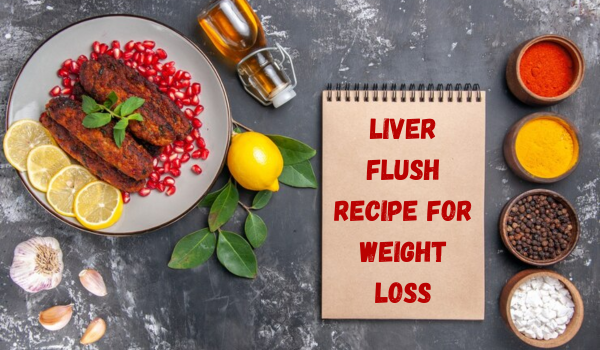Liver Flush Recipe for Weight Loss: What Works and What to Avoid
Liver Flush Recipe for Weight Loss: Science, Safety, and a Smarter Path to Detox

When people talk about losing weight, most think about calorie counting, cardio routines, and cutting carbs. But there’s another organ that silently influences your weight far more than you might realize: your liver.
The liver doesn’t just filter alcohol or break down medications; it’s a central hub for fat metabolism, hormone regulation, and toxin filtration.
So, it’s no surprise that many health trends now focus on the liver flush or liver cleanse, especially those marketed to promote weight loss.
Google “liver flush recipe for weight loss” and you’ll find hundreds of results with homemade concoctions claiming to melt fat, clean your liver, and supercharge your metabolism overnight.
But are these claims legit? Can a simple recipe really “flush” your liver and help you drop pounds?
Let’s cut through the hype and uncover what’s science, what’s myth, and what your liver truly needs to support healthy, lasting weight loss.
Understanding the Liver’s Role in Metabolism and Weight Loss
Before jumping into any cleanse, it helps to understand what the liver actually does. The liver is a complex organ with over 500 functions, but a few key roles tie directly into weight loss:
- Detoxification: The liver filters toxins from your bloodstream everything from environmental pollutants to alcohol and metabolic waste.
- Fat Metabolism: It processes dietary fats and regulates cholesterol production.
- Carbohydrate Metabolism: It helps manage blood sugar by storing and releasing glucose.
- Hormonal Regulation: The liver processes estrogen, insulin, thyroid hormones, and more, all of which can impact body weight.
A sluggish or overburdened liver can interfere with these functions. For example, non-alcoholic fatty liver disease (NAFLD) is associated with obesity and insulin resistance.
But here’s the kicker: most of the time, what we call “toxins” are either not real threats, or are already being handled perfectly well by a healthy liver.
What Is a Liver Flush?
A liver flush (also known as a liver detox or liver cleanse) typically refers to a regimen designed to “clean out” the liver, often through specific ingredients like olive oil, lemon juice, apple juice, and herbal supplements.
Popular liver flush recipes suggest:
- Drinking olive oil and lemon juice at night to stimulate bile production.
- Fasting or eating only fruits and vegetables for a day or two.
- Adding Epsom salts to relax bile ducts and promote “stone” elimination.
- Using apple juice for its malic acid, claimed to soften liver/gallbladder stones.
Some protocols even promise visible “liver stones” will pass in the stool a controversial claim we’ll address shortly.
Common Ingredients in Liver Flush Recipes:
- Extra virgin olive oil
- Fresh lemon or grapefruit juice
- Raw apple cider vinegar
- Organic apple juice
- Epsom salts
- Garlic or ginger
- Turmeric or milk thistle (as herbal additions
The Myth of the Quick Fix What Is a Liver Flush?
A liver flush is typically a short-term regimen, often involving specific dietary restrictions and a particular recipe commonly a mixture of olive oil, lemon juice, and sometimes Epsom salt or herbal teas designed to “flush” the liver and gallbladder of accumulated toxins or stones.
A common DIY liver flush recipe includes:
- 1/2 cup extra virgin olive oil
- 1/4 cup fresh lemon or grapefruit juice
- 1 tbsp grated ginger (optional)
- 1 tsp cayenne pepper (optional)
- Drink before bed on an empty stomach
Proponents claim that you’ll pass liver stones in your stool the next day. But analysis has shown these “stones“ are typically soap-like clumps formed from the oil and lemon juice reacting in your intestines, not actual gallstones.
There’s no scientific evidence that these flushes remove toxins or improve liver health. However, people may feel better due to fasting, placebo effect, or simply drinking more fluids and cutting processed foods for a few days.
The Promises vs. the Proof
Most liver flush advocates promise:
- Rapid weight loss
- Detoxification
- Increased energy
- Clearer skin
- Better digestion
These sound great but here’s the problem: there is little scientific evidence supporting these claims, especially regarding weight loss.
The Truth About Liver Flush Weight Loss:
Any weight you lose from a liver flush is likely due to:
- Water loss from fasting
- Reduced calorie intake
- Temporary emptying of your bowels
This is not fat loss.

Real Foods and Habits That Support Liver Health
Here’s where science and nutrition come together. Certain foods and habits are proven to support liver health, improve metabolic function, and even assist in weight loss over time.
Top Liver-Friendly Foods:
- Leafy Greens (e.g., spinach, kale): Packed with antioxidants and chlorophyll, they help neutralize heavy metals and chemicals.
- Cruciferous Vegetables (e.g., broccoli, cauliflower, Brussels sprouts): Boost levels of detoxifying enzymes.
- Beets: Rich in betalains, which help reduce oxidative stress and inflammation in the liver.
- Garlic: Contains sulfur compounds that activate liver enzymes.
- Green Tea: Rich in catechins, compounds known to improve liver function and fat metabolism.
- Turmeric: Contains curcumin, a potent anti-inflammatory that supports liver detox.
- Berries: High in antioxidants and fiber.
- Fatty Fish (e.g., salmon, sardines): Omega-3s reduce liver fat.
- Avocados: Rich in healthy fats and glutathione, an antioxidant that aids in liver detox.
- Coffee: Surprisingly protective against liver disease (in moderation).
Liver-Supportive Habits:
- Stay hydrated (8+ glasses of water daily)
- Reduce or eliminate alcohol
- Exercise regularly (150 minutes/week)
- Avoid processed sugar and refined carbs
- Get adequate sleep (7–9 hours per night)
Understanding the Liver’s Role in Fat Loss
The liver plays a crucial role in:
- Breaking down fats via bile production
- Regulating glucose and insulin (essential in preventing fat storage)
- Processing hormones that affect metabolism
- Filtering toxins that may interfere with energy production
But here’s the key takeaway:
A healthy liver supports weight loss; it doesn’t cause it directly.
If your liver is sluggish due to a fatty liver condition, high alcohol consumption, or toxic overload it can contribute to fatigue, inflammation, and hormone imbalances. These indirectly affect your ability to burn fat efficiently.
But there is no quick fix. Cleansing your liver takes more than a weekend detox; it’s a lifestyle.
A Sustainable 7-Day Liver Support Plan for Weight Loss
Here’s a realistic plan that combines liver support with healthy weight-loss strategies:
Day 1–7 Overview:
- Morning: Warm water with lemon + 10 min light movement (yoga or walk)
- Breakfast: Green smoothie with spinach, banana, flaxseed, and unsweetened almond milk
- Snack: Handful of berries + green tea
- Lunch: Quinoa salad with kale, beets, chickpeas, olive oil, and lemon dressing
- Snack: Carrot sticks + hummus or boiled egg
- Dinner: Grilled salmon with broccoli and sweet potatoes
- Evening: Herbal tea (dandelion root or milk thistle)
Bonus Tips:
- Avoid alcohol, dairy, and fried foods
- Add 20–30 minutes of brisk walking daily
- Practice mindfulness or journaling at night
This plan doesn’t make wild promises. Instead, it’s rooted in supporting the liver’s natural abilities while promoting habits that drive real, lasting weight loss.

When a Liver Cleanse May Be Worth Considering?
There are cases when liver-specific support might be beneficial under medical supervision.
- NAFLD (Non-Alcoholic Fatty Liver Disease)
- Metabolic Syndrome or Insulin Resistance
- High ALT/AST levels on bloodwork
- Chronic bloating, fatigue, or hormone imbalances
Supplements like milk thistle, NAC (N-acetylcysteine), or alpha-lipoic acid have shown some promise in research. But these should only be used under the guidance of a healthcare professional.
Conclusion
Liver flushes may sound appealing, promising overnight detox and instant slimming, but they’re more hype than science. Your liver doesn’t need shocking cleanses, it needs steady support.
Extreme detoxes using oils, salts, or juices can do more harm than good, often stressing your system. While the liver is key to fat metabolism, hormone regulation, and detoxification, it’s not a magic switch for weight loss.
Real, lasting results come from consistent habits: balanced nutrition, regular exercise, hydration, sleep, and stress management. These may not be flashy, but they work.
A healthy liver thrives on daily nourishment and stability, not dramatic “flushes.” So skip the gimmicks. Support your body wisely, and long-term wellness will follow.
.